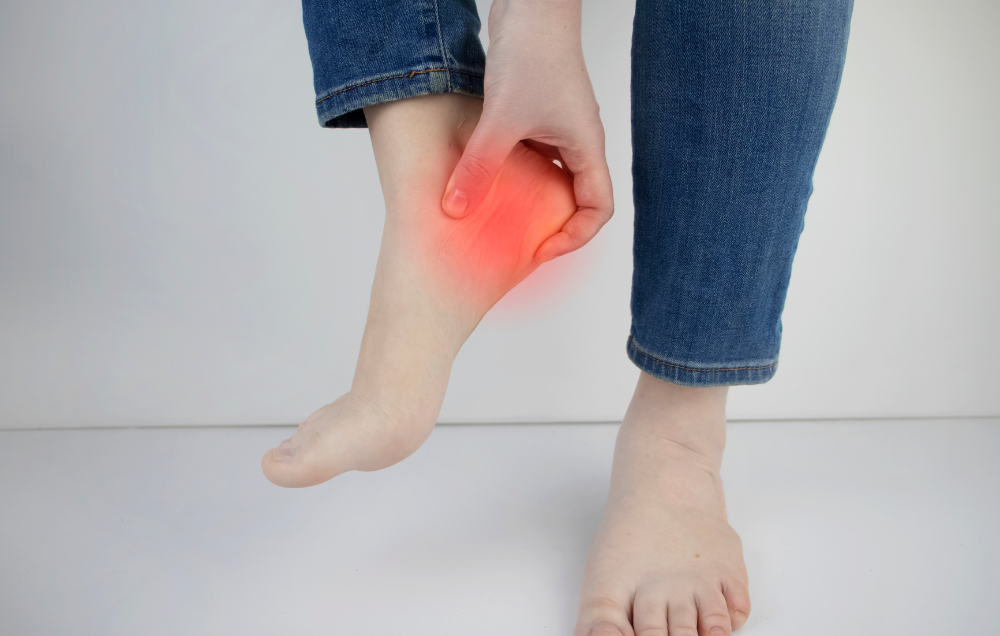Heel pain isn’t just an annoyance; it can affect how you walk, run and even enjoy your daily activities. Heel pain can make the simplest tasks feel like you’re climbing a mountain, no matter if you’re an athlete, casual walker or just someone who spends a lot of time on their feet. Understanding the underlying cause of this sharp pain is essential to help you get back to doing your normal routine with ease. The knowledge of potential causes of sharp heel pain can help empower you to take the next steps toward finding relief and recovery.
10 causes of sharp heel pain and their symptoms
It can feel overwhelming trying to figure out what’s causing your sharp heel pain. The heel is a complex area of your body that supports a significant amount of weight and movement. Sharp heel pain can be due to causes such as:
- Plantar fasciitis — Plantar fasciitis is one of the most common causes of heel pain. It occurs when the plantar fascia, a thick band of tissue that runs along the bottom of your foot, becomes irritated and inflamed. Symptoms of plantar fasciitis can include a sharp pain in the heel, especially in the morning or after long periods of inactivity.
- Achilles tendinitis — Achilles tendinitis is a condition involving inflammation of the Achilles tendon, which connects your calf muscles to your heels. Achilles tendinitis can cause pain and stiffness along the back of the heel, particularly when you climb stairs or play sports.
- Stress fracture — A stress fracture in your heel can occur due to repetitive stress, often from a lot of running or high-impact activities, such as jumping. Symptoms include a gradual increase in pain, swelling and tenderness in the affected heel.
- Referred pain from sciatica — Sometimes, your heel pain isn’t due to an issue in your heel but rather caused by a problem somewhere else in your body. Sciatica is a nerve issue that originates from the back and can lead to sharp or dull pain radiating down the leg to the heel. This pain can also be accompanied by numbness or tingling.
- Bursitis — Heel bursitis involves the inflammation of the bursae, small fluid-filled sacs that help reduce friction between tissue. Bursitis in your heel can cause you to experience pain and swelling, particularly when you move your foot.
- Sever’s disease — Sever’s disease can be common in growing children and adolescents. This condition occurs when the heel bone grows faster than the surrounding tendons and muscles. Symptoms of Sever’s disease can include heel pain during activity and tenderness in the back of the heel.
- Achilles tendon rupture — An Achilles tendon rupture is a more severe injury where the Achilles tendon is torn. This can cause you to experience sudden, intense pain in the affected heel and can also be accompanied by a popping sound. An Achilles tendon rupture typically requires immediate medical attention.
- Haglund’s deformity — Haglund’s deformity is a bony growth on the back of the heel that can cause irritation and pain. This pain and irritation can be worse when wearing tight shoes. Symptoms of Haglund’s deformity include swelling and pain at the back of the affected heel, especially when wearing shoes.
- Bone bruise — A bone bruise can occur from impact or stress on the heel. It can cause localized tenderness, pain and swelling, especially when pressure is applied to the area.
- Heel spurs — Heel spurs are bony growths on the underside of the heel bone. They are often associated with plantar fasciitis and can cause sharp pain in the heel.
How is sharp heel pain diagnosed?
Diagnosing sharp heel pain typically starts with a visit to a health care professional. They will do a thorough assessment, which may include asking about your symptoms, medical history and any activities that may have led to the pain. They may also do a physical examination to help them assess your foot’s range of motion, tenderness and overall condition. In some cases, imaging tests may be necessary to identify underlying issues like fractures, bone spurs or tendon damage. Imaging tests can help providers get a clearer picture of what’s going on inside your heel, allowing them to provide you with a more accurate diagnosis.
How is sharp heel pain treated?
Treatment for sharp heel pain can vary depending on the underlying cause. However, treatment approaches may include:
- Rest and ice — Giving your affected heel a break and applying ice can help reduce inflammation and alleviate pain.
- Physical therapy — A physical therapist can create a personalized treatment plan that may include therapeutic exercises or other approaches. Exercises can help strengthen your foot and leg muscles, improve flexibility, and reduce pain.
- Orthotics — Custom or over-the-counter shoe inserts can provide you with additional support and cushioning for your feet. They can help distribute pressure more evenly.
- Medications — Over-the-counter pain relievers, such as ibuprofen or naproxen, can help reduce inflammation and relieve pain.
- Corticosteroids — In some cases, your health care provider may recommend corticosteroid injections to provide targeted and temporary pain relief and inflammation reduction.
- Surgery — If conservative treatments fail to provide you with relief, your health care provider may recommend surgical options, especially for conditions such as heel spurs or severe tendon injuries.
Ignoring sharp heel pain can lead to a variety of complications, which can lead you to experience chronic pain or more invasive treatments in the future, further impacting your quality of life. While heel pain can be uncomfortable and limiting, understanding the underlying cause and seeking appropriate treatment can provide you with relief.
Forever Fit is your partner in overcoming sharp heel pain
If you’re experiencing sharp heel pain, you don’t have to face it alone. At Forever Fit, we specialize in physical therapy tailored to address a wide variety of conditions that can be behind your heel discomfort. Our dedicated team of licensed physical therapists offers personalized treatment plans designed to meet your unique needs and help you meet your recovery goals. We strive to ensure that you receive compassionate and comprehensive care every step of the way. By working together, we can help you understand the root cause of your sharp heel pain and develop effective strategies for relief and recovery. Take the first step toward a more active and healthier life with Forever Fit today.
Contact our team today for more information or to schedule an initial appointment.

